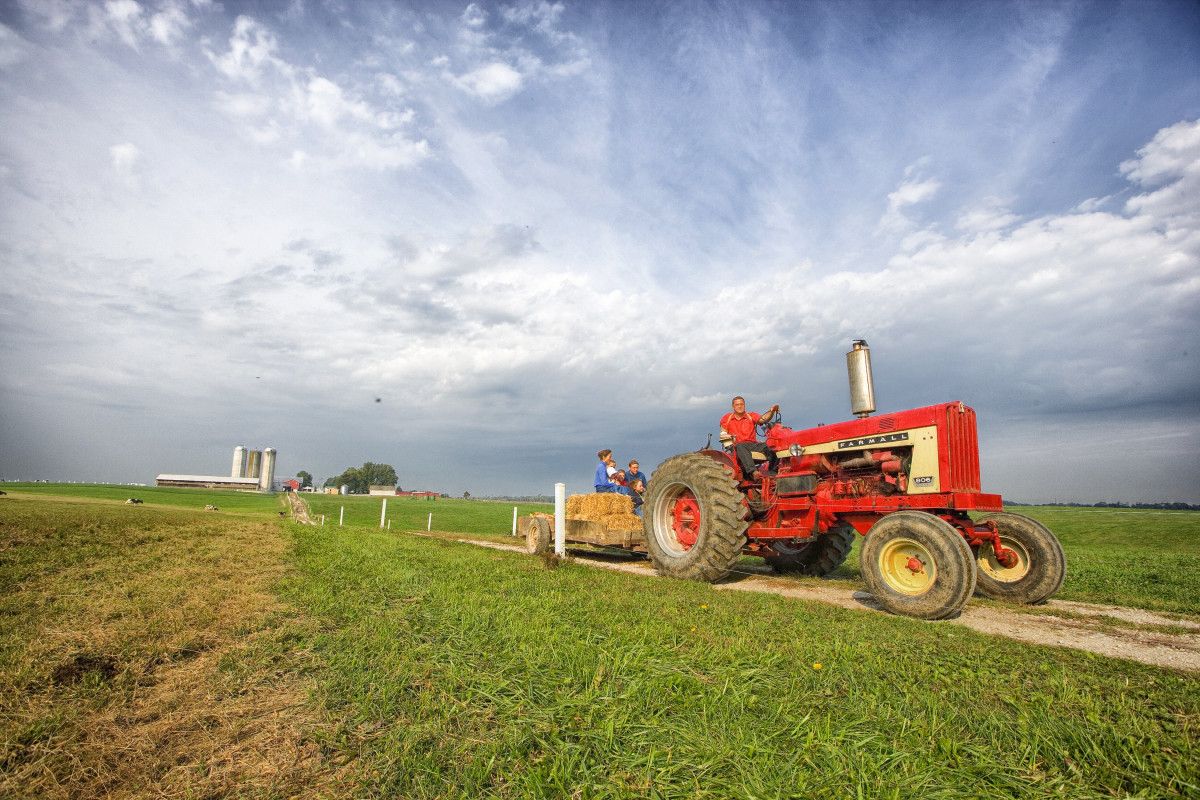Table of Contents
The agricultural landscape is continuously evolving with the integration of advanced technologies in tractor development and farm management. Tractors, once simple mechanical workhorses, have transformed into sophisticated machines boasting autonomy, IoT connectivity, and AI capabilities. This article delves into the latest insights and innovations in tractor data, exploring how these advancements are shaping the future of agriculture, driving efficiency, and supporting sustainable farming practices.
Key Takeaways
- Tractor technology has evolved from manual operations to autonomous systems, with companies like John Deere leading the charge at events like CES 2022.
- IoT and AI are revolutionizing tractor efficiency and capabilities, enabling precision agriculture and smarter farm management.
- Data-driven solutions such as AGMRI Analyze and field data management software are pivotal in optimizing agricultural practices and decision-making.
- Sustainable farming is gaining momentum with innovations like biomethane and electric-powered tractors and the integration of small wind turbines in agribusiness.
- Agricultural business strategies are being enhanced through the adoption of service-oriented solutions and leveraging advanced machinery to capitalize on market opportunities.
The Evolution of Tractor Technology


From Manual to Autonomous: The Journey of Tractor Development
The transition from manual to autonomous tractors marks a significant milestone in the agricultural industry. At the heart of this agricultural revolution lie autonomous tractors, often referred to as driverless tractors or robot tractors. These machines are equipped with state-of-the-art sensors, artificial intelligence algorithms, and precision control systems that enable them to operate with unparalleled efficiency and accuracy.
The scarcity of labor has made autonomous tractors increasingly attractive to farmers. The progression towards full autonomy is evident, with companies like John Deere at the forefront. > Our goal is, by the end of this decade, to be able to have a customer in a corn and soybean operation in this area to be able to have a fully autonomous system across their farm.
The evolution of tractor technology can be summarized in the following stages:
- Introduction of basic mechanical tractors replacing animal and manual labor.
- Integration of GPS and AutoTrac guidance steering systems.
- Development of tractors with autonomous components.
- Launch of remotely guided self-propelled autonomous tractors.
- Expansion towards full-scale production and widespread adoption.
This journey reflects not only a shift in the tools of farming but also a broader trend of innovation and adaptation in the field. From autonomous tractors to robotic farming systems, the industry is embracing sustainable, efficient, and technologically advanced practices.
John Deere’s Leap into Autonomy: A CES 2022 Spotlight
At the forefront of agricultural innovation, John Deere’s autonomous tractor made a significant splash at CES 2022. Unlike traditional product launches within the agricultural sector, Deere chose to unveil its groundbreaking technology to a broader audience, encompassing technology enthusiasts and mainstream media. This strategic move not only highlighted the tractor’s advanced capabilities but also marked a shift in how agricultural equipment is presented to the world.
The autonomous tractor represents a pivotal step in modern farming, offering precision and efficiency on a new scale.
While the autonomous tractor technology was introduced two years prior, its commercial introduction has been a measured process. Deere’s approach to autonomy has been to integrate it gradually, ensuring that each step forward is firmly rooted in reliability and user adaptability. The company’s innovative spirit is evident in its long history of incorporating AI into its machinery, a journey that began with the introduction of the AutoTrac guidance steering system over two decades ago.
Here’s a glimpse of the autonomous tractor’s key features:
- App-based remote control and monitoring
- Advanced AI for real-time decision-making
- Integration with existing farm equipment and workflows
- Enhanced safety protocols for autonomous operation
John Deere’s commitment to autonomy in agriculture extends beyond just tractors. Their vision encompasses a fully integrated farm ecosystem where data and machine learning drive productivity and sustainability.
The Impact of IoT and AI on Tractor Efficiency and Capabilities
The integration of the Internet of Things (IoT) and Artificial Intelligence (AI) into tractor technology has been a game-changer for the agricultural industry. Autonomous tractors, equipped with advanced sensors and AI algorithms, are setting new standards for efficiency and precision in farming operations. These smart machines can perform tasks with minimal human intervention, leading to a significant reduction in labor costs and time.
The benefits of adopting IoT and AI in tractors are numerous and can be summarized as follows:
- Enhanced precision in farming tasks, leading to better crop yields.
- Improved resource management, including the optimal use of water, fertilizers, and pesticides.
- Real-time data collection and analysis for informed decision-making.
- Increased safety with autonomous operations reducing the risk of accidents.
The synergy between IoT, AI, and autonomous tractors is not just about technological advancement; it’s about reshaping the agricultural landscape to be more productive, sustainable, and efficient.
Investments in IoT and AI technologies are crucial for the modernization of agricultural machinery. The adoption of these innovations is not only about staying competitive but also about embracing a future where agriculture meets the demands of a growing population sustainably.
Data-Driven Agriculture


Field Data Management Software: Stratus Ag Research’s Findings
The recent study by Stratus Ag Research has brought to light the significant strides made in the field of data management software for agriculture. Agribusiness analyst Shane Thomas emphasizes the growing adoption of these tools and their transformative impact on farming operations.
Key findings from the study reveal:
- Enhanced data interoperability
- Improved real-time weather insights
- Increased value for money
- Streamlined data connectivity
- Advanced grain marketing and profitability insights
The integration of various data sources into a unified platform has been a game-changer, offering farmers a more comprehensive tool for decision-making.
The study underscores the importance of data-driven solutions in modern agriculture, highlighting how they empower growers to make informed decisions swiftly, leveraging real-time data for optimal farm management.
AGMRI Analyze: Pioneering Agricultural Data Analytics
The advent of AGMRI Analyze marks a significant milestone in the realm of agricultural data analytics. This innovative suite, launched by Intelinair, offers a comprehensive approach to full-season crop analytics. Farmers and agribusinesses now have access to a powerful tool that can transform their decision-making process with actionable insights throughout the 2024 crop season.
AGMRI’s suite is designed to enhance the precision and efficiency of farm operations. By leveraging data from various sources, including satellite imagery and field sensors, the platform provides a granular view of crop health, soil conditions, and environmental factors. This level of detail is crucial for optimizing planting strategies and managing resources effectively.
The integration of AGMRI Analyze into the agricultural workflow promises to streamline operations and boost productivity. Its ability to process and interpret complex data sets is a game-changer for the industry.
The suite’s capabilities extend beyond mere data collection; it offers a robust analysis that informs every aspect of farm management. From seed placement to harvest, AGMRI equips farmers with the knowledge to make informed decisions that can lead to increased yields and sustainability.
Drones and AI: A Synergy Enhancing Farming Accessibility
The integration of drone technology with artificial intelligence (AI) is revolutionizing the agricultural landscape. Farmers are now harnessing the power of drones to collect vast amounts of data, which, when analyzed by AI, can lead to more informed decision-making and increased crop yields. This synergy not only makes AI more affordable and easier to manage but also enhances the accuracy of agricultural practices.
By leveraging drones, farmers can monitor crop health, optimize pesticide use, and manage resources more efficiently. These advancements are particularly beneficial for small to medium-sized farms, which may have previously found such technology to be cost-prohibitive.
The benefits of this technology are clear, as outlined in the article 5 Ways Drones Are Making AI More Accessible to Farmers. Here are a few key points:
- Cost reduction: Drones reduce the need for manual labor and lower the barriers to entry for utilizing AI in farming.
- Precision agriculture: Enhanced data collection leads to better crop management and soil analysis.
- Risk management: Early detection of issues such as pest infestations or water stress can prevent crop losses.
As the agricultural sector continues to evolve, the role of drones and AI will undoubtedly expand, offering new opportunities for farmers to improve efficiency and productivity.
Sustainable Farming Innovations


The Role of Biomethane and Electric-Powered Tractors in Eco-Friendly Agriculture
The agricultural industry is witnessing a significant shift towards sustainability, with companies like Yanmar AG and AUGA Group leading the charge in electric and biomethane-powered tractor technology. Yanmar’s e-X1 electric drive compact agricultural machine is a testament to the company’s commitment to the YANMAR GREEN CHALLENGE 2050, aiming to revolutionize sustainable solutions in agriculture.
AUGA Group’s recent patent for their M1 tractor underscores the growing trend of eco-friendly innovations designed to meet the sustainability challenges on large farms. This aligns with the broader European push for environmental regulations, which has spurred the rapid expansion of the electric terminal tractor market.
The integration of advanced technologies such as telematics systems and automation features not only enhances the efficiency and safety of these eco-friendly tractors but also sets a new standard for the industry.
The following table highlights the recent achievements in sustainable tractor technology:
| Company | Innovation | Award | Year |
|---|---|---|---|
| Case IH | Steiger 715 Quadtrac tractor | AE50 | 2024 |
| New Holland | T6.180 Methane Power tractor | AE50 | 2024 |
Hybrid-powered terminal tractors are also gaining traction, offering a blend of traditional combustion engines with electric propulsion systems. This approach not only reduces fuel consumption and emissions but also cuts operating costs, making it a sustainable and cost-effective solution for the future of farming.
Smart Farming and Regenerative Agriculture: The EU’s Climate Challenge
The European Union faces a significant challenge in aligning agricultural practices with its ambitious climate goals. Smart farming and regenerative agriculture are at the forefront of this transformation, aiming to reconcile productivity with environmental stewardship. The adoption of these practices, however, is not without its hurdles.
- Smart Farming: Utilizes data-driven technologies to optimize resource use and crop management.
- Regenerative Agriculture: Focuses on restoring soil health, increasing biodiversity, and sequestering carbon.
The transition to these sustainable practices is crucial for the EU’s agricultural sector, which must innovate to overcome the ‘climate cognitive dissonance’ that farmers face.
Despite the clear benefits, the uptake of smart farming and regenerative techniques has been slow. This is partly due to the complexity of implementing new systems and the need for tailored solutions that consider the unique conditions of each farm. Investment in education and support for farmers is essential to facilitate this shift and ensure the long-term viability of the EU’s agribusiness.
Small Wind Turbines: Integrating Renewable Energy into Agribusiness
The integration of small wind turbines into agribusiness is becoming increasingly significant as farms seek energy independence and sustainable practices. A recent study by FREEN has underscored the importance of these renewable energy solutions, highlighting not just the environmental benefits but also the potential for operational cost reduction.
Small wind turbines offer a dual advantage for agribusinesses: they contribute to a greener footprint while also providing a hedge against fluctuating energy prices.
The adoption of wind energy in agriculture aligns with the broader market drivers that emphasize the need for sustainable operations. As the industry moves towards more eco-friendly practices, small wind turbines stand out as a viable option for farms to reduce their carbon footprint and embrace renewable energy sources.
Here is a snapshot of the highlighted benefits from the FREEN study:
- Energy independence
- Operational cost reduction
- Environmental sustainability
Enhancing Agricultural Business Strategies


Adopting Comprehensive Service-Oriented Solutions for Agribusiness
In the realm of agribusiness, adopting comprehensive service-oriented solutions is pivotal for staying competitive and meeting the ever-evolving demands of the agricultural sector. These solutions encompass a range of services, from advanced fertilizer and spraying machinery to innovative irrigation systems, all designed to optimize farm operations and enhance productivity.
- Advancements in Agricultural Innovations
- Advanced Fertilizer and Spraying Machinery
- Innovative Irrigation Systems
- Increasing Use-Cases of Generative Artificial Intelligence in Agriculture
- Adoption of Comprehensive Service-Oriented Solutions
The integration of intelligent control systems and model predictive control-based approaches for equipment like vineyard sprayers exemplifies the ongoing trends in autonomous agriculture equipment. These systematic and integrated monitoring solutions are reshaping how farmers manage their crops and resources.
The surge in demand for remote solutions and the need for sustainable agricultural operations are key business drivers in today’s market. However, challenges such as lack of interoperability and standardization, as well as limited accessibility and adaptability, must be addressed to fully harness the potential of these service-oriented strategies.
Leveraging Advanced Machinery for Improved Agricultural Practices
The agricultural sector is witnessing a significant shift towards advanced machinery that enhances farming practices. Technological innovations, such as precision farming technologies and IoT-enabled implements, are not only reshaping agricultural practices but also driving the demand for sophisticated tractor attachments.
The integration of advanced machinery is crucial for addressing the challenges of natural resources, water availability, and soil degradation. Manufacturers are increasingly focusing on sustainable technologies that can boost production efficiency while being eco-friendly.
| Region | Mechanization Increase | Government Initiatives |
|---|---|---|
| Asia Pacific | Rising adoption | Supportive policies and subsidies |
The adoption of advanced machinery is a testament to the industry’s commitment to innovation and sustainability.
Market opportunities in agricultural innovations are expanding, with a growing need for advanced fertilizer and spraying machinery, innovative irrigation systems, and the increasing use cases of generative artificial intelligence in agriculture. These advancements are not only beneficial for large-scale operations but also for smallholders looking to optimize their practices and outputs.
Navigating Market Opportunities in Agricultural Innovations
The agricultural sector is witnessing a significant transformation, driven by the relentless pursuit of efficiency and sustainability. Market opportunities in agricultural innovations are abundant, with advancements in technology paving the way for a new era of farming. The integration of advanced fertilizer and spraying machinery, alongside innovative irrigation systems, is revolutionizing crop management practices.
Businesses are increasingly leveraging generative artificial intelligence, which is opening up new avenues for growth and optimization. The adoption of comprehensive service-oriented solutions is also becoming a cornerstone for those looking to stay competitive in this dynamic market.
The key to capitalizing on these opportunities lies in understanding the ongoing trends and business dynamics. Intelligent control systems, such as the MPC-based approach for vineyard spraying, are setting new standards for autonomous agriculture equipment. Design innovations are not only enhancing the functionality of agriculture equipment but also contributing to systematic and integrated monitoring solutions.
However, navigating this landscape comes with its challenges. The lack of interoperability and standardization, coupled with limited accessibility and adaptability, poses hurdles that businesses must overcome to harness the full potential of agricultural innovations.
Conclusion
As we have explored the dynamic world of tractor data, it is evident that the agricultural industry is on the cusp of a technological revolution. From the unveiling of autonomous tractors by John Deere at CES to the integration of AGMRI Analyze for enhanced data analytics, the advancements are not only reshaping farming practices but also offering sustainable solutions like the AUGA Group’s biomethane and electric-powered tractor. The insights gleaned from Stratus AG Research and the innovative use of drones underscore the potential of data-driven agriculture to optimize workflows and streamline processes. As farmers grapple with climate cognitive dissonance and the transition to regenerative agriculture, the role of technology becomes increasingly crucial. The future of agribusiness hinges on embracing these innovations, prioritizing producer experiences, and investing in advanced machinery and AI to thrive in an era where smart farming is not just an option, but a necessity for growth and sustainability.
Frequently Asked Questions
How has tractor technology evolved over the years?
Tractor technology has evolved from manual, human-operated machines to highly sophisticated autonomous systems. Developments in IoT and AI have significantly enhanced tractor efficiency and capabilities, allowing for more precise and data-driven farming practices.
What was significant about John Deere’s presentation at CES 2022?
At CES 2022, John Deere revealed its first autonomous tractor, marking a significant leap into autonomy for the company. This was a strategic move to showcase their innovation to both technology and mainstream media, as well as potential investors.
What role do drones and AI play in modern agriculture?
Drones equipped with AI technology are revolutionizing agriculture by making data analytics more accessible to farmers. They optimize workflows, streamline processes, and leverage data to improve crop management and decision-making.
How is sustainable farming being promoted through tractor innovations?
Sustainable farming is being supported by innovations such as biomethane and electric-powered tractors, which offer environmentally friendly alternatives to traditional farming methods. Small wind turbines are also being integrated into agribusiness to promote the use of renewable energy.
What are the benefits of adopting service-oriented solutions in agribusiness?
Adopting comprehensive service-oriented solutions in agribusiness helps farmers manage operations more efficiently, leverage advanced machinery, and improve agricultural practices through access to sophisticated technology and data analytics.
What market opportunities are emerging from agricultural innovations?
Agricultural innovations are creating market opportunities in areas such as advanced fertilizer and spraying machinery, innovative irrigation systems, and the use of generative AI in agriculture. These advancements are driving demand for sophisticated tractor attachments and service-oriented solutions.





